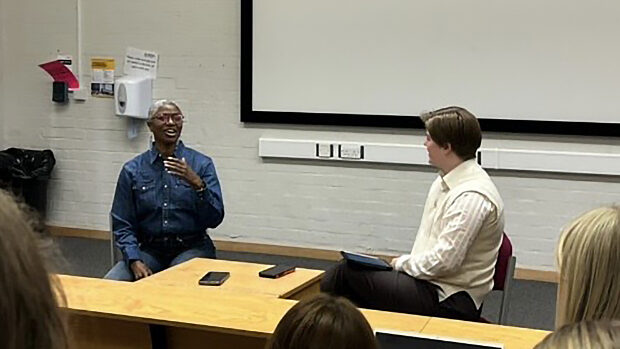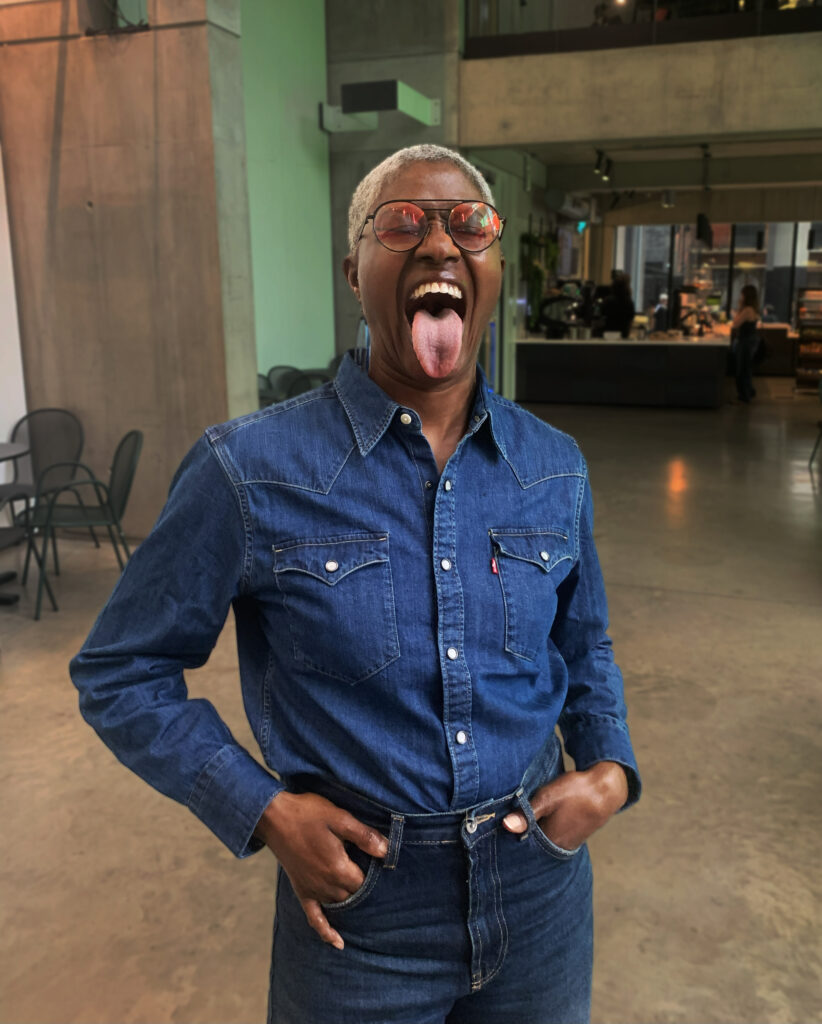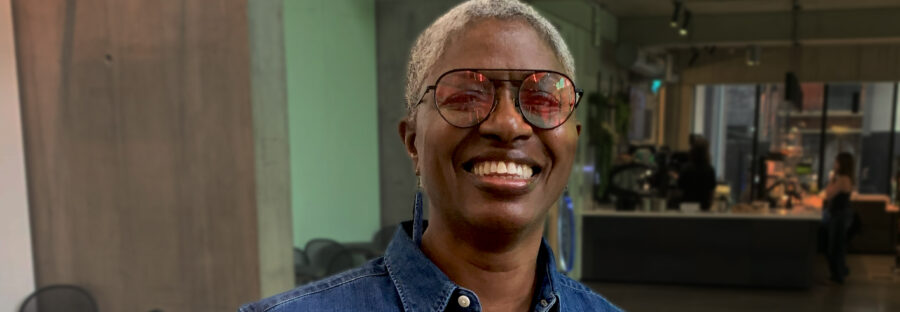DJ Paulette: from the living room to Europe and back
From the minute she could stand, Paulette Constable knew her place was above the crowds. As a little girl, she spent her days on her Petite Typewriter writing weekly zines into the backs of cornflake boxes – and spent her evenings performing for her six sisters and brother on the little step in the living room.
“And I’d fall off the step and my sisters would laugh at me and I’d look at them and go, ‘you’ll pay to come and see me one day,” she says.
Now 58, DJ Paulette couldn’t have been truer to her words. Skyrocketing from the glory days of The Haçienda to the Ministry of Sound, Paris, Ibiza, and back, Paulette’s career has seen her spinning decks for more than three decades. A proud winner of the DJ Mag Top 100 Lifetime Achievement Award (2022) and of Sound City’s Keychange Inspiration Award (2023), the star has no plans to slow down anytime soon.
Sitting before a crowd of students in a draughty lecture hall at Manchester Met – once the Polytechnic, where Paulette had studied English Literature – it isn’t hard to imagine that the peeling brick walls may have once been familiar to the musician.

“When I started DJ-ing I was studying here and it actually paid for my degree. That’s how I paid for my books and paid my rent and paid my bills,” she says. “I actually was probably one of the richest students by the time I left. In the three years I’d been there, I went from never having DJ’ed to DJ-ing all around the UK, being a resident at The Haçienda, and being on Granada TV and Radio One!”
Race and flesh
It was a sudden plunge into a career she herself admits she had no experience of until a friend of a friend offered her £30 to spin decks at the Number 1 Club. With no turntables, no training and no one to ask for help, Paulette would later reflect in her book ‘Welcome to the Club’: “It seemed like a great idea, so I agreed.”
Having sunk her student grant into new records, Paulette would later write of her anxiety ahead of the night – not of her first performance, but of being stopped by police on the way home. Widespread suspicion of queer culture combined with the UK’s SUS laws – which were widely used by police to target Black people through stop and search – were a taint on Paulette’s memory of her early career. Her next stint DJ-ing for The Haçienda’s Flesh nights was no exception.
“Everyone descended on The Haçienda on the last Wednesday of every month,” she says. “We were doing a big queer party in the biggest club in Manchester – not on the outskirts, which was where they wanted everything different. There was also the SUS laws in operation at the time, which meant for Black people coming into the city centre, we weren’t wanted, we weren’t welcomed.
“There was a colour bar in operation in the UK, which meant in entertainment spaces – pubs, bars, clubs – Black people weren’t allowed in in any great number. There was a quota in operation, so you could see maybe one or two or three Black people. Any more than that and they would be turned away.
“At Flesh, straight people would kiss their same sex mates to get into the club. To go to anything queer before that, people would spit at you in the street. So to change people’s thinking and get it so that people would pretend to be queer to get into the party – it made queer cool.”
Far from Paulette’s mind, at the time, was what would happen when she did encounter the police on the streets of Paris, 2005, DJ-ing for a street festival of over 30,000 people in support of Aids awareness.
‘What the hell is it?’
“An organisation called Solidays called me and said, ‘we would like you to play,'” she says. “‘Would you like to do it?’ And I’d only been in Paris maybe four months. I had the backing of the Ministry of Sound and I played at Queen Club (Paris). And from then I was the top female house music DJ in France.’
“So I was like, ‘oh, yeah, yeah, yeah, I’ll do your party,’ thinking it was just a little thing.
“I got to the party, and they were like, right, okay, you need your accreditation, we need your passport, blah, blah, blah,” she laughs. “And then they put me in a police car. I was like, what the hell is it?

“We got a police escort through the streets of Paris because the streets were all closed down and there was just people everywhere. And I was like, ‘ohh, this isn’t just some garden party. This is bigger than I thought’.
“I was playing with two DJs, who I found out were Etienne De Crecy and Bob Sinclar. Now those two were, and still are, two the biggest French DJs you could possibly play with – and there was me, DJ Paulette, there in the middle!
“I smashed it, absolutely smashed it,” she grins. “I played one of the best sets I’ve ever played, and from there, I was the top female DJ in France. I toured non-stop for 10 years.”
‘I’m still growing’
Her fame would follow her to Germany and Ibiza before she flew back to her home city. Back in Manchester and plunged into a pandemic, it is only now she’s climbed the hill that Paulette can look back at how far she’s come.
When asked who has influenced her in her career, Pauline laughs: “Me! I mean, that sounds very glib, but it is me, and there are lots of other people too.

“I know what I’ve had to do and the battles that I’m still fighting in order to bring other people through. I know which people I’ve supported and have bought through that are bigger than me now, which is amazing.
“Every day I inspire myself, because I know I’ve learned a lot of lessons and I’m still growing. I know I’ve got a lot of things I’m going to do – and that I’m going to achieve so much more.”


